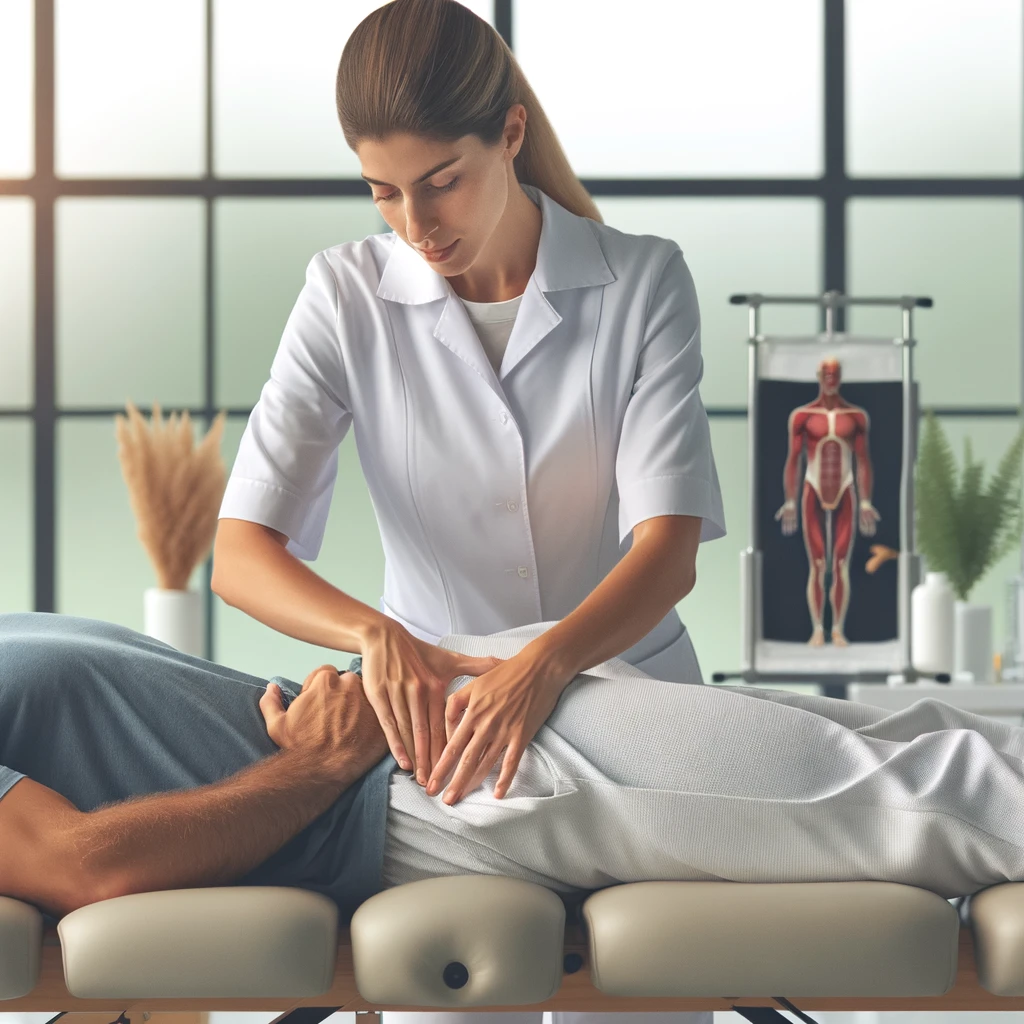Back
Managing Testicular Pain After Hernia Repair with Pelvic Floor Physical Therapy
By Dr. Zarina Vitebsky, DPT, MSPT, PRPC, TPS, LPF, DN on 2/27/2024

Introduction
Explanation of Hernia Repairs in Males
Hernia repairs are a common surgical procedure for males who have a weakened abdominal wall. This can be caused by factors such as aging, obesity, or strenuous physical activity. During a hernia repair, the weakened area is reinforced with a mesh or sutures to prevent the hernia from protruding through the abdominal wall. While hernia repairs are generally considered safe and effective, there are potential complications that can arise.
Common Complications of Hernia Repairs
Some of the most common complications of hernia repairs include infection, bleeding, and recurrence of the hernia. However, one lesser-known complication is testicular pain. This can occur when the nerves in the groin area are damaged during the surgery, leading to discomfort and pain in the testicles. This can be a frustrating and debilitating side effect for male patients.
Focus on Testicular Pain and Pelvic Floor Physical Therapy
In cases where testicular pain persists after a hernia repair, pelvic floor physical therapy may be recommended. This type of therapy focuses on strengthening the muscles and tissues in the pelvic floor, which can help alleviate pain and discomfort in the testicles. It may also involve techniques such as manual therapy and relaxation exercises to release tension in the pelvic floor muscles.
Understanding Hernia Repairs
Definition of a Hernia
A hernia is a medical condition where an organ or tissue pushes through a weak spot in the surrounding muscle or connective tissue. In males, the most common type of hernia is an inguinal hernia, which occurs in the groin area.
Types of Hernias in Males
Aside from inguinal hernias, males can also experience other types of hernias such as umbilical hernias, femoral hernias, and incisional hernias. Each type of hernia has a specific location and may require a different approach for repair.
Causes of Hernias
Hernias can be caused by a variety of factors, including genetics, age, and lifestyle choices. In males, the most common cause of hernias is a weakness in the abdominal wall, which can be present from birth or develop over time due to strain on the muscles.
Overview of Hernia Repair Surgery
Hernia repair surgery is a common procedure used to fix a hernia. It involves pushing the protruding organ or tissue back into place and strengthening the surrounding muscle or tissue to prevent future hernias. However, in some cases, hernia repair surgery can lead to complications such as testicular pain.
Complications of Hernia Repairs
Infection
One of the most common complications of hernia repairs is infection. This can occur due to the surgical incision or from the use of surgical instruments. Infections can range from mild to severe and may require additional treatment such as antibiotics or even a second surgery to clean out the infected area. In some cases, the infection can spread to other parts of the body and become life-threatening.
Recurrence of Hernia
Despite the success rate of hernia repairs, there is still a chance of the hernia coming back. This is known as a recurrence and can happen due to various reasons such as improper surgical technique, weak tissue, or strain on the area. Recurrence of a hernia may require another surgery to repair it, leading to additional pain and discomfort for the patient.
Chronic Pain
Some patients may experience chronic pain after a hernia repair, which can last for months or even years. This can be due to nerve damage during the surgery, scar tissue formation, or improper healing. Chronic pain can significantly impact a person's quality of life and may require pain management techniques or even pelvic floor physical therapy to alleviate the discomfort.
Testicular Pain
In some cases, males may experience testicular pain after a hernia repair. This can be due to damage to the nerves or blood vessels in the area, or due to the mesh used in the repair. Testicular pain can be debilitating and may require further medical intervention, such as pelvic floor physical therapy, to address the underlying issue and provide relief.
Testicular Pain After Hernia Repair
Causes of Testicular Pain After Hernia Repair
There are several potential causes of testicular pain after a hernia repair surgery. One of the most common causes is nerve damage during the surgery, which can lead to chronic pain in the testicles. Other possible causes include infection, scar tissue formation, and inflammation of the surrounding tissues.
Symptoms of Testicular Pain
The symptoms of testicular pain after hernia repair may vary depending on the underlying cause. Some common symptoms include a dull or sharp pain in the testicles, swelling or tenderness in the scrotum, and difficulty urinating. In some cases, the pain may also radiate to the groin or lower abdomen.
Impact on Daily Life
Testicular pain after hernia repair can have a significant impact on a person's daily life. The pain can be debilitating and make it difficult to perform daily tasks, such as walking, standing, or sitting for extended periods. It can also affect a person's ability to work or participate in physical activities, leading to a decrease in overall quality of life.
Importance of Seeking Treatment
If you are experiencing testicular pain after a hernia repair, it is essential to seek treatment from a healthcare professional. Ignoring the pain or trying to manage it on your own can lead to further complications and potentially worsen the condition. A doctor can properly diagnose the underlying cause of the pain and develop a treatment plan, which may include pelvic floor physical therapy, to help alleviate the symptoms and improve your overall well-being.
Pelvic Floor Physical Therapy
Definition and Purpose of Pelvic Floor Physical Therapy
Pelvic floor physical therapy is a specialized form of physical therapy that focuses on the muscles, ligaments, and connective tissues in the pelvic region. The purpose of this therapy is to improve the function and strength of these muscles, which can help alleviate symptoms such as testicular pain after hernia repair.
How it Can Help with Testicular Pain after Hernia Repair
After a hernia repair surgery, it is common for males to experience testicular pain due to the trauma and manipulation of the pelvic region. Pelvic floor physical therapy can help by addressing any imbalances or weaknesses in the pelvic floor muscles that may be contributing to the pain. By strengthening and improving the function of these muscles, the pain can be reduced or eliminated.
Techniques Used in Pelvic Floor Physical Therapy
There are various techniques used in pelvic floor physical therapy, including exercises, manual therapy, and biofeedback. Exercises may include kegel exercises, which involve contracting and relaxing the pelvic floor muscles, as well as stretches and strengthening exercises for the surrounding muscles. Manual therapy techniques, such as massage and trigger point release, can also be used to address any tightness or tension in the pelvic floor muscles. Biofeedback involves using sensors to monitor muscle activity and provide visual or auditory feedback, helping patients to better control and strengthen their pelvic floor muscles.
Benefits of Pelvic Floor Physical Therapy for Males with Testicular Pain
Pelvic floor physical therapy has been shown to be an effective treatment for males with testicular pain after hernia repair. By addressing the underlying issues in the pelvic floor muscles, it can help reduce pain and discomfort, improve bladder and bowel function, and enhance sexual function. It is a non-invasive and drug-free approach that can provide long-term relief for those suffering from testicular pain.
Steps for Pelvic Floor Physical Therapy for Testicular Pain
Initial Assessment and Evaluation
The first step in pelvic floor physical therapy for testicular pain is an initial assessment and evaluation. This typically involves a thorough medical history, physical examination, and possibly imaging tests to determine the cause of the pain. The physical therapist will also assess the strength and function of the pelvic floor muscles.
Developing a Personalized Treatment Plan
Based on the assessment and evaluation, the physical therapist will develop a personalized treatment plan for the individual. This may include specific exercises, manual therapy techniques, and lifestyle modifications to address the underlying cause of the testicular pain.
Techniques and Exercises Used in Pelvic Floor Physical Therapy
Pelvic floor physical therapy may include a variety of techniques and exercises to help alleviate testicular pain. These may include pelvic floor muscle strengthening exercises, relaxation techniques, biofeedback, and manual therapy techniques such as trigger point release or myofascial release. The physical therapist will work with the individual to determine the most effective techniques for their specific case.
Progress Monitoring and Adjustments to Treatment Plan
As the individual progresses through their treatment plan, the pelvic floor physical therapist will monitor their progress and make any necessary adjustments. This may include increasing or decreasing the intensity of exercises, modifying techniques, or adding new exercises to target specific areas of concern. Regular progress evaluations will help ensure that the treatment plan is effective and tailored to the individual's needs.
Long-Term Management and Prevention of Testicular Pain
Pelvic floor physical therapy not only aims to alleviate current testicular pain, but also to prevent future occurrences. The physical therapist will work with the individual to develop a long-term management plan that may include ongoing exercises and lifestyle modifications to maintain pelvic floor muscle strength and function. This can help prevent future hernia repairs and testicular pain.
Reach Out to Us
If you’re experiencing pelvic floor dysfunctions associated with the issues above, please reach out to us at Pelvic Health Center in Madison, NJ to set up an evaluation and treatment! Feel free to call us at 908-443-9880 or email us at receptionmadison@pelvichealthnj.com.
Read More:
Exercise to reduce pelvic floor dysfunction associated with childbirth?? By Amalie Malka Flamm on 7/25/2024 What exercises can help reduce pelvic floor dysfunction associated with childbirth? Why does my taint hurt (male)? By Shannon Strauch, PTA, STMT-1 on 7/24/2024 Where is your perineum, what is it's function, and why do you have pain?
Are you ready to live pain free?
Request An Appointment